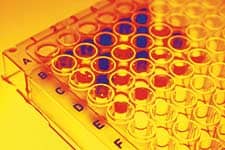
Testosterone levels are associated with sexual development, libido, protection against osteoporosis, and cardiovascular health. In men, insufficient testosterone levels (hypogonadism) have been linked to obesity and low libido. In women, polycystic ovary syndrome (PCOS) is a common endocrine disorder that can result in excessive production of testosterone, leading to infertility, irregular or absent menstrual periods, and hirsutism (excess body and facial hair). Inappropriate testosterone levels can also result in precocious or delayed puberty. The measurement of testosterone plays an important part in the diagnosis of many conditions and it can guide treatment decisions.
Published studies have shown, however, that many currently available testosterone tests are not sensitive enough to measure low levels of testosterone. This limits the clinical utility of these tests. To address this need and help physicians accurately measure the wide range of testosterone levels seen in men and women, Abbott, Abbott Park, Ill, has received FDA clearance for a new testosterone test.
“The ARCHITECT 2nd Generation Testosterone Assay is more sensitive, accurate and precise than previous versions of the assay,“ says Frank Quinn, PhD, FACB, director of global scientific affairs for Endocrinology, Abbott. “The improved assay performance means physicians will be able to obtain more reliable measurements of testosterone and use this information to help guide patient treatment decisions.”
The new assay runs on Abbott’s fully-automated ARCHITECT family of analyzers and is available in the United States, as well as in several European countries, Asia Pacific, Latin America, Japan, Africa, the Middle East, and India, pending country registration.
The assay is a chemiluminescent microparticle immunoassay for the quantitative determination of testosterone in human serum and plasma. Measurements of testosterone are used in the diagnosis and treatment of disorders involving:
- The male sex hormones (androgens) including primary and secondary hypogonadism, delayed or precocious puberty, and impotence in males; and
- In females, hirsutism (excessive hair) and virilization (masculization) due to tumors, polycystic ovaries, and androgenital syndromes.
[Source: Abbott]



